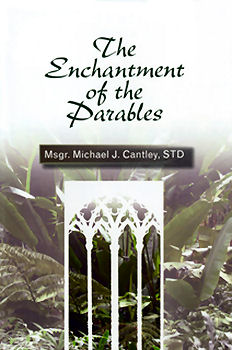
|
Posted November 1, 2010
Book: The Enchantment of the Parables Author: Msgr. Michael J. Cantley, STD St. Paul/Alba. Staten Island, NY. 2010. pp. 296 An Excerpt from the Jacket:
An Excerpt from the Book: All Saints Day: The Beatitudes according to Matthew Commentary: The first two verses of the Beatitudes mention a dual audience: the “crowds” and Jesus’ “disciples” indicating that he taught all of “them.” Presumably both groups heard the message since at the end in 7:28 “the crowds were astonished.” We may suggest that Jesus is teaching his disciples, but welcomes the crowds as potential disciples. There is an important contrast in literary style between Matthew and Mark right at the beginning. Mark, in 3:13, says of Jesus, “He goes up toward the mountain” (using the ‘historical present’ to describe a past event in an effort to get the audience to feel personally involved in the action) “and called those whom he desired.” Matthew uses the past tense, “He went on the mountain.” This suggests, again, Matthew’s dependence on Mark, but also his willingness to use his source freely. When we ask the purpose of this inaugural sermon, we have to recall that in Matthew’s theology Jesus has already been identified as “King”, the genealogy that is structured on Jesus being of David’s line, 1:18-25, the dream of Joseph, “son of David”, 2:2 the question of the Magi, “Where is he who is born king of the Jews?”). Matthew clearly wants to reveal Jesus’ Kingship right from the beginning. Now, as Jesus begins his teaching mission, Matthew presents him as designating those who are the citizens of his Kingdon. The Sermon on the Mount tells his disciples who they are and how they are expected to live their lives. It tells the “crowds” what awaits them if they become disciples. The word :blessed” is common to the Psalms and the Wisdom literature (see Pr 3:13; 28:14). The thrust of the thought in the Old Testament is of blessedness already possessed. In the New Testament it is eschatological, a future blessedness awaiting the fullness of the Kingdom. The number of Beatitudes is often disputed. The third beatitude “Blessed are the meek” is thought by some scholars to be a gloss explaining the first. Nevertheless, the benediction of the “meek” is far more central than such a theory would allow. It may well be the key to all of the other Beatitudes. The Greek word (prautes) translated while rendered meek, humble, gentle, mild (all words that describe how a person with this quality appears to others) these meaning do not do justice to the Greek word, which is really a description of the interior strength of the person possessing this quality. The common assumption is that the meek person cannot assert himself. But Jesus is self-described as “meek and humble of heart” (Mt. 11:29), and this because he has inexhaustible divine resources of strength at his command. Meekness is equanimity of spirit that enables the person possessing it to be consistent whatever the external circumstances might be. The other Beatitudes may very well presuppose this quality. One needs great interior strength to be “poor in spirit,” a “mourner for justice’s sake,” “hungry and thirsty for righteousness,” “merciful,” “single minded,” “a peacemaker” and undaunted in persecution. None of the Beatitudes loses its own uniqueness if this were true. But all seem to be better anchored. Matthew calls the “poor in spirit” blessed, where Luke 6:20 simply says, “Blessed are you poor.” Where Matthew is abstract and sets a universal principle, Luke is concrete, speaking to the disciple directly. Neither intends to make a virtue out of poverty or want, but both hear Jesus blessing those who are not content with the goods of this world and seek a fulfillment this world cannot give. In the presence of a magnificent feast, the hungry person has greater desire and enjoyment than the man who is so full he cannot eat another bite. Jesus is teaching that the Kingdom of Heaven belongs to those who have such great desire for it that they prefer it to all other goods. It is the empty disciple that God can fill. Table of Contents: Introduction 1. Entry into God’s Kingdom 2. Prerequisite attitudes to enter God’s Kingdom 3. The cost of discipleship 4. The fullness of revelation in Jesus 5. Christ’s return and the final judgment 6. Commentary on the Sermon on the Mount 7. Bringing the story the Resurrection into modern times |
|
